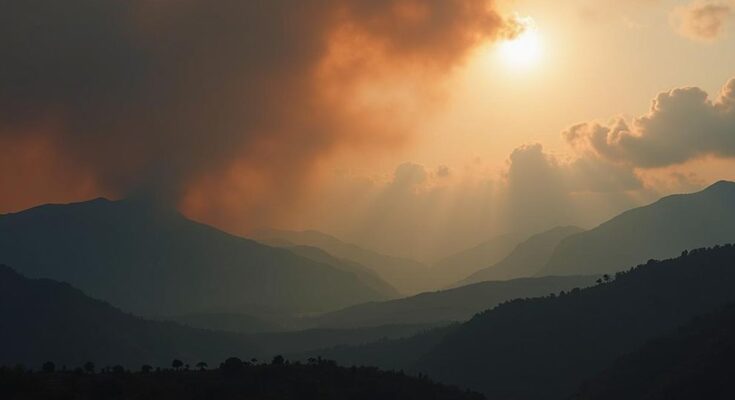South America is facing a severe environmental crisis due to rampant wildfires, primarily driven by human activities. The situation has resulted in significant public health impacts, airport closures, and emergency declarations across multiple countries, highlighting the interconnectedness of climate issues on the continent. Health officials call for urgent action to combat this alarming trend as smoke blankets cities and ecosystems are threatened.
The current environmental scenario in South America is increasingly dire, with vast areas engulfed by smoke due to widespread wildfires largely instigated by human activities. The renowned blue skies of Rondônia in the Brazilian Amazon have been overtaken by thick smoke, affecting both air quality and public health. These fires have been rampant from Ecuador to Paraguay, and their smoke disruptions have led to airport closures and school shutdowns. Dr. Lilian Samara de Melo Lima from Porto Velho has observed a significant rise in respiratory ailments among the populace, attributing this crisis to the reckless encroachment upon once-pristine jungles. Marilene Penati, the health secretary of Porto Velho, reiterated the appalling conditions faced by the city’s residents, highlighting that the problem extends beyond Brazil and encompasses the entire continent. With record fires detected across Colombia, Venezuela, and Paraguay coupled with a historic drought linked to climate change and the El Niño phenomenon, various ecosystems are in peril. In Paraguay, California fires have severely impacted the Chaco region, compromising the indigenous Ayoreo community. The situation is equally alarming in Peru, where forest fires have consumed considerable land and prompted declarations of emergency in several regions. The prime minister’s misattribution to traditional slash-and-burn methods rather than acknowledging the fires’ origins in illegal agricultural expansion has drawn ire from experts. Moreover, in Ecuador and Bolivia, similar fires have spread, pushing local authorities to declare states of emergency. Ultimately, health secretary Penati poignantly remarked on the urgency of the climate crisis, echoing Pope Francis’s call for action to alleviate the situation, lamenting society’s general apathy toward the escalating destruction of the planet.
The article addresses the escalating crisis of wildfires in South America, which have been intensified by human land-use practices, climate change, and natural phenomena such as El Niño. The Amazon rainforest—often referred to as the lungs of the Earth—is experiencing unprecedented destruction that goes beyond Brazil, affecting neighboring countries such as Peru, Bolivia, Ecuador, and Paraguay. This has serious implications not only for the environment but also for public health as towns and cities become engulfed in smoke, leading to respiratory issues among the inhabitants. Furthermore, indigenous communities, particularly those depending on land and resources within these ecosystems, face severe existential threats.
The widespread wildfires across South America are indicative of a larger climate emergency that requires immediate collective action. The devastating impact on health, environment, and indigenous communities cannot be overstated, as smoke shrouds cities and ecosystems are lost. Despite the acknowledgment from health officials and scientists regarding these urgent issues, there remains a concerning lack of action from politicians and society at large. It is imperative that global attention focuses on both immediate disaster response and long-term solutions to address climate change and its disruption of natural ecosystems.
Original Source: www.theguardian.com




